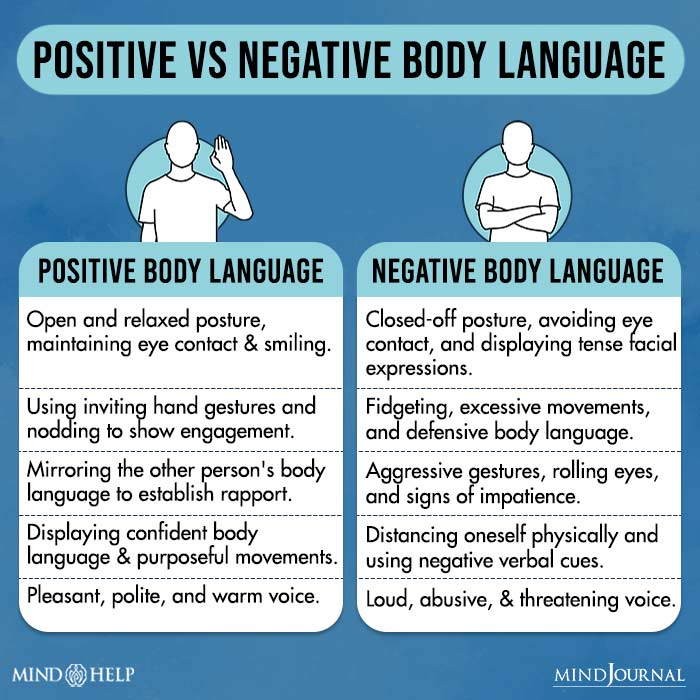Body language cues and nonverbal cues can say so much about a person. However, there are certain body language cues that can instantly make someone like you. Want to know what they are? Read on then!
KEY POINTS
- We can form impressions of strangers’ likability from very limited information, most nonverbal, study finds.
- Nonverbal cues of immediacy are critical in creating positive (or negative) first impressions.
- Body language immediacy cues can make or break an initial encounter, and help combat stereotypes and biases.
Imagine that you are meeting a stranger for the first time. There is a natural tendency to jump to a conclusion: “I like/don’t like that person.”
This is known as making a “snap judgment.” Psychological research tells us that first impressions made in just the first few moments of an interaction can affect how we perceive others, and how we react to them.
This is an obvious problem in important interactions, such as job interviews, or when meeting someone that we might (or might not) do business with. It also can affect whether we decide to make friends with others or simply continue interacting with them.
Research in nonverbal communication has uncovered some of the cues that lead to greater liking and attraction, particularly in initial encounters.
This cluster of body language cues is referred to as cues of “immediacy” (Andersen, 1985; Mehrabian, 1971).
What are these cues that trigger instant likability?
Related: The Power of Perception: Why Reading Emotional Expressions is Vital
5 Body Language Cues That Lead to Instant Likability
- Eye Contact. Looking into another’s eyes is a cue of immediacy—it shows interest and attentiveness.
- Forward Lean and Physical Distance. Orienting the body toward the other person, with a slight forward lean, and maintaining some (but not too much) physical closeness.
- Smiling. A pleasant face is always evaluated more positively than a frown.
- Facial and Gestural Animation. We positively evaluate others who seem energetic and animated. Stiff, non-expressive body language is a turnoff. Expressive, animated others draw us in.
- Warm and Expressive Tone of Voice. Just as in facial animation, we are more drawn to persons who put emotion into their voices and those whose voice tone is warm and inviting.
Other Cues: If appropriate, touch can be a cue of immediacy. A slight touch on an arm, or a warm greeting—such as offering to shake hands—is also good for making that initial good impression, and creating a sense of connectedness.
Of course, you can overdo it. It is important to regulate these cues of immediacy. For instance, avoiding eye contact is a turnoff, as is too much staring.
Getting too close and invading someone’s personal space is another no-no. And, being overly expressive and emotional can also lead to a negative initial impression.

New Study on Cues of Immediacy
In a recent study, published in the Journal of Nonverbal Behavior (Lu & Guerrero, 2023), it was found that cues of immediacy can be important when meeting strangers, even via video/Zoom meetings. Immediacy cues can even break down cultural stereotypes.
In this study, students met on Zoom, with a fellow student, who was actually a confederate of the experiment. The confederates were introduced as either another U.S. student or a Middle Eastern student.
In different conditions, the confederates either displayed high or low levels of nonverbal immediacy cues.
Before the Zoom meeting, the student participants were presented with information about the stranger (e.g., whether they were a U.S. or Middle Eastern student, as well as their likes and dislikes).
Students rated their likability of the stranger initially from the provided information, and again after the Zoom meeting.
Related: 10 Body Language Cues That Can Instantly Give You Away
As predicted, both U.S. and Middle Eastern confederates who displayed more nonverbal immediacy cues were rated more highly than those who did not engage in body language cues of immediacy.
Moreover, immediacy helped to overcome some of the bias against Middle Eastern students.
Conclusion: Body language cues of immediacy are important when meeting new people. Think about this the next time you are going on a job interview, going to a social function, or, perhaps, even in your job when you are trying to get close to a customer or associate.
References:
Mehrabian, A. (1971). Nonverbal communication. Routledge.
Andersen, P. A. (2014). Nonverbal immediacy in interpersonal communication. In Multichannel integrations of nonverbal behavior (pp. 1-36). Psychology Press.
Lu, A. H., & Guerrero, L. K. (2023). Effects of Nonverbal Immediacy and Similarity on Perceptions of Likability and Friendship Potential: First Impressions of US and Middle Eastern Students on Zoom. Journal of Nonverbal Behavior, 1-24.
Riggio, R. E., & Friedman, H. S. (1986). Impression formation: The role of expressive behavior. Journal of personality and social psychology, 50(2), 421.
Written By Ronald E. Riggio
Originally Appeared On Psychology Today









Leave a Reply
You must be logged in to post a comment.